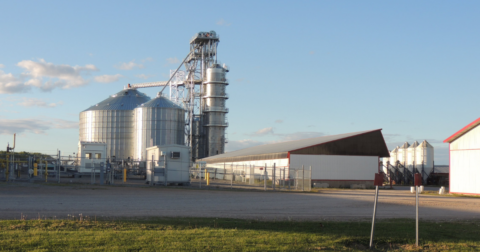Feature
Dairy and Meat Industries Push for Access to H-2A Farmworkers While the Trump Administration Slashes Their Pay
Policy•13 min read
Feature
Pitched as a boon to small towns, the biodigester financed $41.5 Million via the town of Gillett, promising jobs and future tax revenue.


Words by Nina B. Elkadi
Zahn’s Farms LLC, an approximately 11,500-head dairy operation in Gillett, Wisconsin, is the site of WI RNG Hub North, a manure methane digester project funded using $41.5 million worth of tax-exempt municipal bonds financed by the town. On June 1, the project, developed and run by Aerogy LLC, missed their $1.7 million principal payment, raising questions about the fate of the project and its impact on Gillett.
Methane digesters, like the one at Zahn’s Farms, are frequently pitched as climate-smart solutions to one of the biggest environmental critiques of animal farming: the emissions and pollution caused by manure. According to the non-profit World Resources Institute, manure from cows and pigs constitutes one percent of total U.S. greenhouse gas emissions. Biodigesters are a technology for processing the manure by allowing microbes to break down the organic material. The result is biogas, a mix of primarily methane and carbon dioxide, that is touted by the booming biogas industry as renewable energy.
In the case of this project, the biogas is piped all the way to California in exchange for lucrative alternative fuel credits. These credits are paid for by fossil fuel companies, ostensibly to comply with California’s Low Carbon Fuel Standard, but according to Carbon Pulse, researchers have warned that the “generous credits” are “distorting markets and undermining climate goals.”
A blog from one of the mechanical contractors involved in the dairy digester paints the Zahn’s Farms project as creating a new path forward, where cow waste is the future: “When people think of Wisconsin dairy farms, they picture rolling farmland, hardworking farmers, and fresh milk turning into world-class cheese. What they rarely picture is the waste.”
There are “tons of it, produced daily by hundreds of Holstein dairy cows,” the post continues. “But what if that waste could fuel homes, power local businesses, and reduce our reliance on fossil fuels?”
The contractors also write that the digester turns “dairy waste into something the entire community can benefit from,” implying that the gas is bringing energy to the local community — refraining to mention that the gas ends up piped to California.
Aerogy, the renewable fuel platform behind the project, is a company created by Macquarie Capital, a multinational investment bank headquartered in Australia. In a press release, Macquarie Capital touted the Zahn’s Farms “anchor investment” project and the level of financing secured.
The town of Gillett issued $41.5 million worth of municipal bonds that led to the creation of the biogas facility. Minnesota-based UMB Bank served as the trustee, allowing developers of the project to access cash at a reduced interest rate. The bondholders then, in theory, get that interest back, tax-free, and the developers get a low-interest loan.
There are numerous reasons why a company might want to use municipal bonds. It allows them to raise money quickly without having to sell off a stake of their own business. Industrial revenue bonds also do not show up on company books — essentially, the town of Gillett ended up serving as a conduit for funding this project, for free. Local involvement also gives the appearance of public support.
Another appealing feature: municipal bonds tend to have long maturities — the period between issuance and when the bondholder gets its money back. But the project here only has a seven-year maturity, a shorter-than-usual timeline, which suggests the developers were eager to sell.
A pitch for funding from Progressive Energy, an investment partner in the project, points to this possibility. “Our business is going nicely but we wish to ramp it up faster and the likelihood of a profitable exit in three to five years is very real based off of recent transactions (by Shell, BlackRock and BP) in the market,” the CEO and COO of the company wrote in a post on AskForFunding.com.
“It’s just directly extracting wealth from our communities and giving it to high-income people. And it’s blatant. It’s not subtle at all,” Lisa Doerr, a Wisconsin hay farmer and advocate with Sustain Rural Wisconsin Network, tells Sentient. When any type of company typically opens in a city, they’re charged taxes. Because the financing for the digester was via municipal bonds, the financing was tax-exempt. The $41.5 million project has defaulted on its principal payment, reducing the likelihood of project longevity, and therefore, future tax revenue that could go toward schools and other public services in Gillett.
A source familiar with the matter wrote to Sentient that, “WI RNG Hub North LLC is currently in discussions with bondholders to restructure the debt, which is 100% owned by institutional investors and backed solely by the credit of the WI RNG project.” They also wrote that the Town of Gillett “has no financial exposure to the bonds” and “is not responsible for the repayment of the debt or any other financial obligations.”
One possible reason for the defaulted payment could be that the market for digester tax credits created by California’s Low Carbon Fuel Standard has now plummeted. In a presentation for the biodigester, one consulting group based their accounting on a $170 per metric ton tax credit price. But a report analyzing prices from July 28–August 3, 2025 found that the average price per metric ton was down to $53.08. A source familiar with the matter wrote to Sentient that a new regulatory framework could “positively impact LCFS prices.” This “positive price momentum” might occur in late 2026, the source wrote.
In the same presentation, the value of each cow’s yearly manure was pitched as $1,360 based on all the tax credits the company would receive. To a city council that represents a population of approximately 1,200, this probably looked pretty good: The prospect of a company that could make millions in revenue each year was pretty attractive in the long-term, when they could start being taxed. That is, if the company ever got to the point of generating revenue.
Alternative fuel tax credits can be purchased from dairy and other farm digester projects, when manure is “digested” and turned into energy, like biogas. But methane digesters are imperfect solutions to a massive problem. In some cases, these projects increase the number of cows on farms, creating more manure, and ultimately worsening the problem the new technology was pitched to fix. In Kewaunee County, Wisconsin, research by the non-profit group Friends of the Earth shows that “herd sizes at CAFOs with a digester grew by 58%.”
Biogesters can also go awry, and end up emitting toxic gases into the atmosphere. There are also high-risk incidences that would occur when piping biogas — according to the non-profit Public Interest Research Group, “a gas pipeline incident occurs somewhere in the U.S. approximately every 40 hours,” contributing pollution to the very problem they were designed to mitigate.
Even when digesters work as intended, the World Resource Institute estimates that digesters “reduce methane from manure storage by only about 25%,” and methane can leak from multiple parts of the digester system.
Critics of factory farm expansion see mostly downsides. “All they bring is more consolidation and a whole other set of pollution issues,” Doerr says, not to mention a decline in nearby property values. “The benefits are hard to see.”
In a Facebook message, a representative from Zahn’s Farms wrote to Sentient, “I see Sentient is an anti-animal extremist group, Zahn’s Farms LLC is not the owner nor the operator of the anaerobic digestor, nor is responsible for making bond payments. Aerology [sic] LLC is who you are looking to communicate with.” Note: Sentient is a non-profit news outlet, not an advocacy group or extremist group of any kind, and a member of the Institute of Nonprofit News.
Aerogy and Macquarie Capital both declined to comment. The mayor of Gillett and the Wisconsin Economic Development Corporation did not respond to requests for comment.